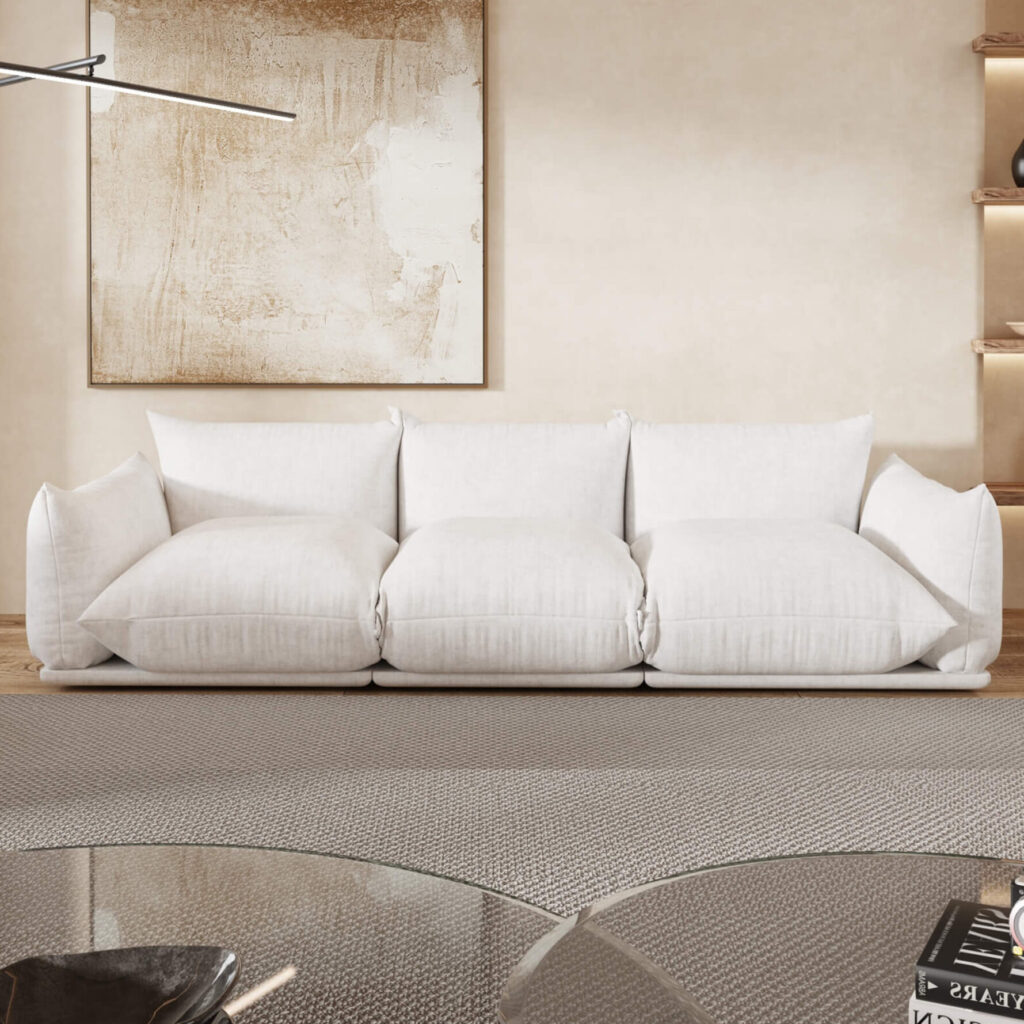Let’s face it, furniture is a significant investment, and your living room pieces, especially the sofa, take center stage. They set the tone for your space, become the backdrop for countless memories, and need to withstand the test of time (and maybe a rogue juice box or two). But with a seemingly endless sea of materials and styles to choose from, how do you navigate the furniture jungle and find the best material for couch?
Fear not, design devotees! This post is your ultimate guide to conquering the Living Room Furniture Material Showdown. We’ll be dissecting the pros and cons of various materials, exploring options beyond the classic fabric and leather, and helping you find the perfect match for your unique style, lifestyle, and budget.
So, grab your design hat (and a measuring tape—we’re about to get practical!), and get ready to transform your living room from furniture flop to a haven of comfort, function, and fabulousness!
10 Best Material for Couch
1. Leather
Leather is a classic choice and is often regarded as the best material for couches by many homeowners. It’s incredibly durable, easy to clean, and offers a level of sophistication that can’t be matched. Plus, it ages beautifully, developing a patina over time that adds character to the sofa. However, good quality leather can be expensive, and it may feel cold in winter and sticky in summer. If you have pets, you’ll need to watch out for scratches.
2. Chenille Fabric

Chenille fabric for couch is another popular option due to its soft and inviting texture. It offers a plush feel that makes any couch extra comfortable. Chenille is also known for its durability and ability to withstand everyday wear and tear. Its thick, tufted strands create a luxurious look, making it a great choice for both traditional and contemporary interiors. However, chenille can be a bit challenging to clean, so it’s best suited for households without young children or pets. Regular vacuuming and professional cleaning can help maintain its appearance.
3. Faux Leather
Faux leather, also known as leatherette or vegan leather, can be a good alternative to real leather. It looks similar to leather but is generally more affordable and animal-friendly. It’s also pretty resistant to scratching, making it a pet-friendly choice. However, it may not breathe as well as real leather, and it may crack or peel over time, particularly with cheaper versions.
4. Polyester
As a synthetic material, polyester is budget-friendly and highly durable. It’s often blended with other fibers to create microfiber, a fabric that is soft to the touch, water-resistant, and easy to clean, making it a popular choice for households with children or pets. However, polyester might not offer the same luxurious feel as some other materials.
Related to: Reinventing Your Space With Sohnne’s Industrial Sofa And Iconic Chair Replicas
5. Linen
Linen sofas bring a light, airy feeling to any space. This natural fabric is known for its breathability, smoothness, and durability. However, linen can wrinkle and soil easily, which means it may not be the best material for couches in homes with kids and pets. Linen also requires professional cleaning to maintain its appearance.
6. Velvet
For a sofa that exudes luxury and glamour, you can’t go wrong with velvet. This fabric is incredibly soft and plush. Plus, velvet’s deep color tones and light-reflecting properties can make your sofa look like a piece of art. However, velvet requires more care than most other materials. It can be difficult to clean and might not be the best choice for households with children or pets.
7. Wool
Wool is a natural fabric that’s warm, resilient, and incredibly durable. It’s resistant to pilling, wrinkling, soiling, and fading, making it a long-lasting choice. However, wool sofas can be expensive and may require professional cleaning. Also, some people might find the fabric itchy.
8. Cotton
Cotton is a popular choice due to its durability and comfort. This natural fabric is breathable, hypoallergenic, and generally easy to clean. When blended with synthetic fibers, cotton can become even more durable and stain-resistant. On the downside, pure cotton can wrinkle and might not stand up to heavy wear and tear as well as some other fabrics.
9. Silk
For the ultimate luxury, consider silk. This delicate, natural fabric is soft, shiny, and elegant. However, silk is prone to sun damage and requires professional cleaning, so it’s typically reserved for formal, adult-only spaces. Given its high cost and care requirements, silk is not typically the best material for couches in everyday use.
10. Synthetic Blends
Synthetic blends, like polyester-cotton or polyester-nylon, offer the best of both worlds. These fabrics are designed to be durable, affordable, and easy to clean. They’re also less prone to fading or shrinking. However, synthetic blends might not have the same luxe feel as pure natural fibers, and their environmental impact might be a concern for some.
11. Performance Fabrics
Lastly, let’s not forget performance fabrics. These are materials specifically designed to be durable, easy to clean, and resistant to stains and fading. Examples include Crypton fabric and Sunbrella. These fabrics are ideal for families, pet owners, and anyone who wants a low-maintenance sofa. However, they can be more expensive than other options.
Choosing the Best Material for Living Room Furniture Like a Pro: Beyond the Surface
Beyond the Seating: The best material for living room furniture isn’t just about sofas! Here are some additional considerations:
- Wood: A timeless classic, wood furniture adds warmth and natural beauty to any space. Popular options include hardwood (oak, maple) and softwood (pine). Pros: Durable, beautiful, classic. Cons: Requires regular maintenance, can be susceptible to scratches and dents.
- Metal: Metal furniture offers a sleek and modern aesthetic. Common options include wrought iron and stainless steel. Pros: Very durable, easy to clean. Cons: Can feel cold to the touch, can show scratches easily.
- Upholstered Ottomans: Ottomans offer versatile seating and storage solutions. Consider performance fabrics or easy-to-clean leather for high-traffic areas.
Remember, the best material for your living room furniture depends on your individual needs and priorities! Here are some key factors to consider:
- Lifestyle: Do you have kids or pets? Do you entertain frequently? Choose a material that can handle the wear and tear of your lifestyle.
- Durability: How long do you expect your furniture to last? Invest in high-quality materials if you’re looking for long-term pieces.
- Comfort: You’ll be spending a lot of time in your living room, so make sure your furniture is comfortable! Test different materials and textures to find what feels best for you.
- Maintenance: Some materials require more maintenance than others. Consider how much time and effort you’re willing to put into cleaning and upkeep.
- Budget: Furniture can range in price depending on the material and quality. Set a budget and stick to it!
By following these tips and utilizing the expert knowledge in this guide, you’ll be well on your way to conquering the furniture jungle and finding the best material for your living room furniture.
So, unleash your design creativity, personalize your space with a mix of textures and materials, and get ready to transform your living room into a haven of comfort, style, and functionality. Don’t forget to share photos of your fabulous living room in the comments below—I can’t wait to see your design victories!
- Durability: How much wear and tear will your furniture experience? Choose a material that can handle your lifestyle.
- Comfort: You’ll be spending a lot of time on your furniture, so prioritize comfort! Test different materials and textures to find what feels best for you.
- Maintenance: Some materials are easier to clean than others. Consider how much time and effort you’re willing to put into maintaining your furniture.
- Style: Don’t forget about aesthetics! Choose a material that complements your overall design scheme.
- Budget: Living room furniture is an investment, so set a realistic budget and explore options that fit comfortably within your range.
Best Sohnne’s Couch Recommendations!
Pacha Lounge Chair Replica
This lounge chair is often upholstered in premium fabrics like wool-blend or velvet, offering excellent durability and a luxurious feel. The upholstery choices of the Pacha Lounge Chair Replica are painstakingly selected for their quality, and their durability ensures that the chair will remain comfortable and attractive for many years. This sort of care in material selection is a significant part of what you’re paying for when investing in a high-end piece of furniture.
Tateyama Sofa Replica
When it comes to selecting the best material for a couch, the fabric and construction materials play a significant role. The Tateyama Sofa Replica doesn’t disappoint in this regard. It’s upholstered in luxurious teddy velvet fabric, a material renowned for its softness and durability. This fabric not only gives the sofa its plush feel but also contributes to its longevity, ensuring you can enjoy its comfort for many years.
The supporting metal element is constructed from high-quality 304 stainless steel. This type of stainless steel is known for its corrosion resistance, strength, and durability, meaning it can maintain its pristine condition for a long time, even with regular use.
Marenco Sofa Replica 2 Seater
The Marenco Sofa Replica 2 Seater boasts an oversized shape, complete with generous seat cushions that exude an inviting character. It’s not just the seat, but also the back and arm elements of the sofa that are fully padded, guaranteeing comfort that’s hard to match. With its rounded, bulbous shapes, the sofa creates an environment of relaxation and pure bliss, consistently sparking joy in its users – a claim backed by extensive research.
Conclusion
From the timeless sophistication of leather and faux leather to the soft luxury of velvet and silk, the best material for a couch truly depends on your individual needs and lifestyle. Synthetic blends and performance fabrics have carved their niche in the market for their durability and easy maintenance, while natural fabrics like cotton, linen, and wool continue to be favored for their breathability and comfort.
In the quest for the perfect sofa, the Marenco Sofa Replica 2 Seater by Sohnne stands out, demonstrating that innovative design, quality materials, and comfort can seamlessly intertwine to create an exceptional piece of furniture.
Ultimately, the best sofa material for you will balance comfort, durability, and style, all while aligning with your budget. Be sure to consider these ten essential materials before making your next sofa purchase. After all, a well-chosen sofa can enhance your living space and provide comfort and relaxation for years to come. Happy shopping!
Read more: Laminate Vs Wood Flooring: Which Is Best For Home Flooring?





